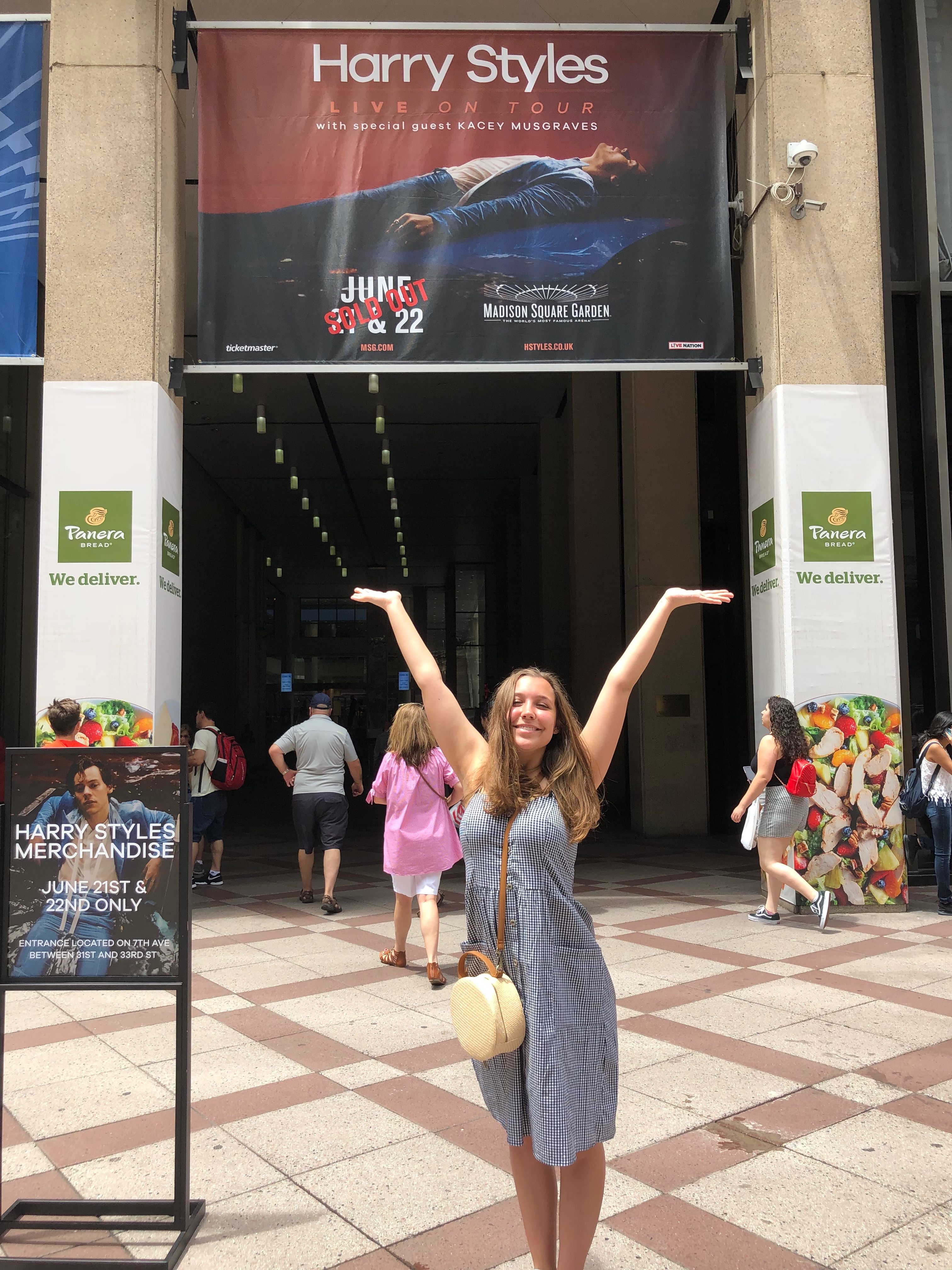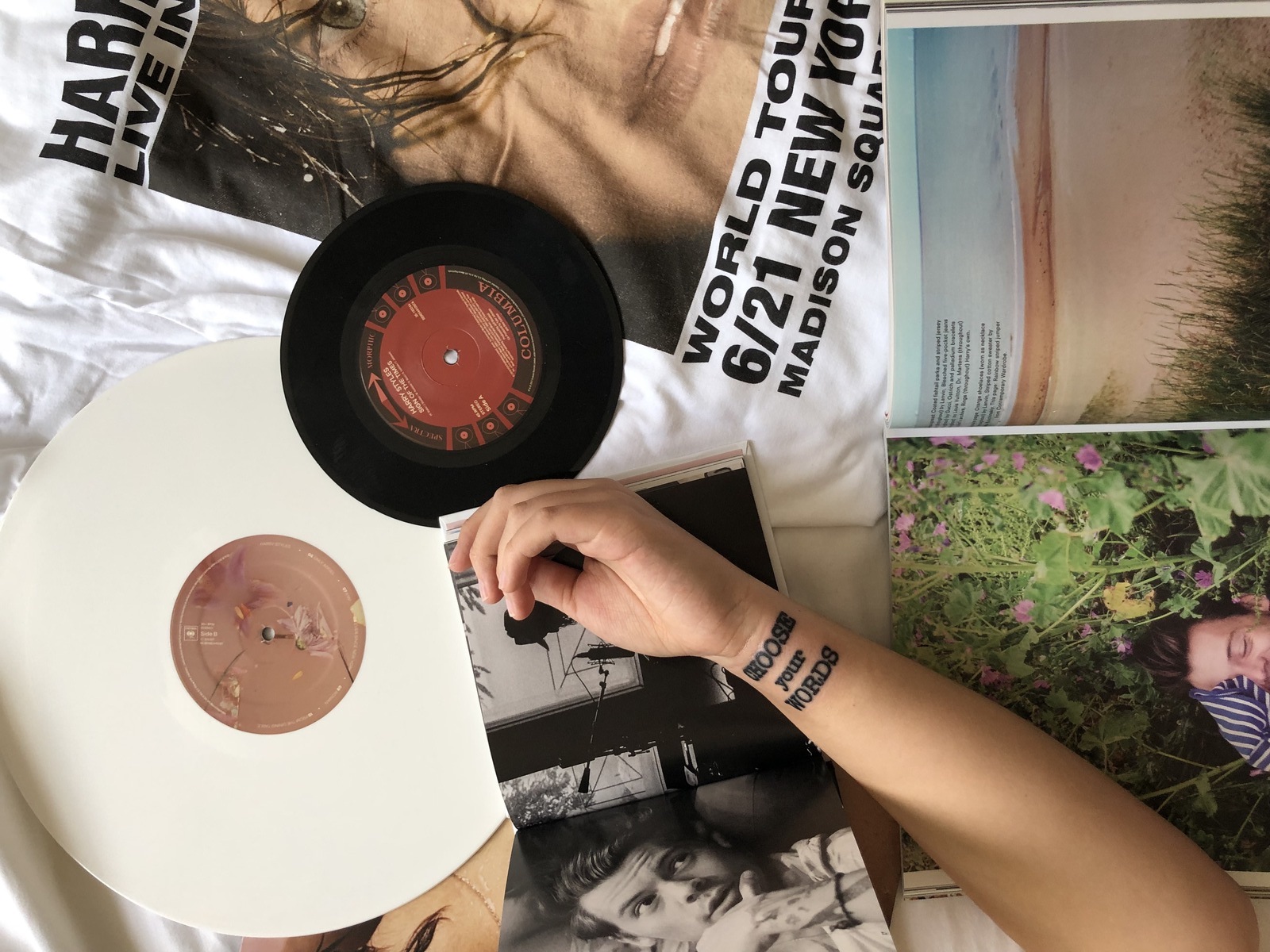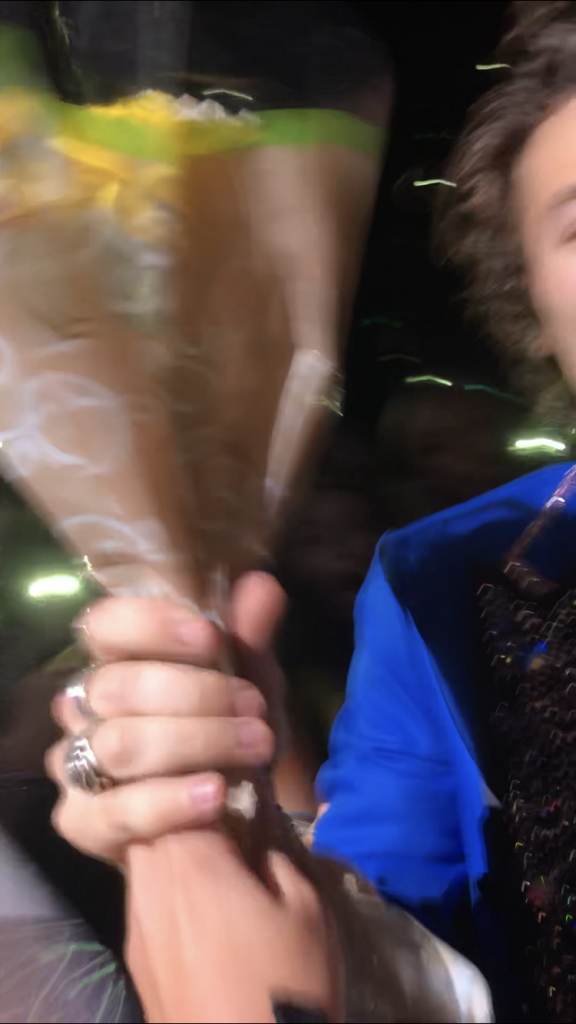You’re obsessed.
He doesn’t even know you exist.
You’re wasting your money.
Grow up already. Isn’t he for 12-year-olds?
He doesn’t care about you.
You’re embarrassing yourself.
You’ll never meet him.
Being a fan of One Direction since 2010 and continuing to support Harry Styles on his solo journey, I know I have heard it all. But nothing anyone says has ever made me feel bad about idolizing someone who represents kindness, equality, support, inclusion, and love.
Harry recently adopted the slogan “Treat People With Kindness.” The phrase is embroidered onto almost all his merchandise, printed onto water bottles and tote bags, and even written on the side of his customized Calvin Klein tank tops. But he doesn’t just promote the message to his fans: He lives it himself, day by day.
“I love every single one of you,” Harry has said to his fans. “If you are black, if you are white. If you are gay, if you are straight, if you are transgender. Whoever you are, whoever you want to be. I support you.”
Throughout his time in One Direction and as a solo artist, Harry has reached out to fans to help them through personal struggles. During his 2018 solo tour, for example, he helped a bisexual fan come out after reading her sign saying, “I’m gonna come out to my parents because of you!!!” He then asked the audience to quiet down so he could get the fan’s mother’s name and shouted, “Tina, she’s gay!” into his microphone, adding “Tina says she loves you. Congratulations, I’m very happy for you.” Through his music, interviews, and concerts, Harry makes sure his fans know just how important they are to him, and how he is accepting of whoever they want to be.
Raised in Holmes Chapel, England, Harry started his singing career in 2006 when he and three friends at Holmes Chapel Comprehensive school started their band White Eskimo. But he had dreams for something bigger. On April 11, 2010, 16-year-old Harry stepped in line to audition for the X-Factor U.K.
After Harry was cut during the show’s bootcamp, Simon Cowell decided to send Harry and four others—Niall Horan, Zayn Malik, Liam Payne, and Louis Tomlinson—through as a group rather than as five separate soloists. Harry is credited with creating the name One Direction, and the band advanced to the semi-finals before placing third on Dec. 12, 2010. Cowell later signed the band to his record deal. Their first single, “What Makes You Beautiful,” was released almost a year later, giving fans an idea of what to expect on the band’s first album, “Up All Night.”
Four more albums and world tours later, One Direction decided it was time for a break. Because of his separation from the band, Harry had room to grow as a solo artist and explore his own sound, which led to the release of his first single, “Sign Of The Times,” on April 7, 2017. Later that year, he released a self-titled album and the dates for his first world tour as a soloist.
Throughout his years in the spotlight, Harry has had the ability to both positively and negatively influence his fans. According to Newport Academy, celebrities heavily impact how their fans—specifically teens—view themselves and the world around them. Often, celebrities serve as role models for teens, whether it be for better or for worse. Teens tend to morph their own attitudes and behaviors in ways that mirror their famous idols.
Models, in particular, can have a severe impact on teenage body image. I have experienced this firsthand, and it led to dangerous habits. It started with the occasional glance at Instagram pages belonging to models like Kendall Jenner and Gigi Hadid, some visits to magazine websites like Vogue or Elle, and searches for healthy recipes on Pinterest. But it quickly spiraled into something much worse.
A 2014 survey by the Today Show and AOL found nearly 80 percent of teen girls compare themselves to the bodies and lifestyles of celebrities on social media. Of this percentage, almost half were unhappy with their appearances because of what they saw online.
This dissatisfaction with body image is linked to mental and physical health problems, including body dysmorphia, depression, and eating disorders. Newport Academy shares that studies have shown a high percentage of girls and women who consume media related to body image and unrealistic, thin body types are more likely to exhibit disordered eating habits. Celebrities who post about unhealthy fad diets and seemingly impossible workout routines trigger these harmful thoughts and actions, minimizing just how severe eating disorders can be.
Social media contributed to my belief that the size of my waist and the number on the scale defined my worth. But my eating disorder wasn’t sparked by Instagram posts and Pinterest boards. It started when I was young.
I was a 4-year-old ballerina comparing my legs to the legs of other dancers, wondering why mine were bigger. I was an 8-year-old cheerleader wondering why my uniform fit differently from the others, why I had to hold all the prettier girls in the air, and why I couldn’t be one of them. I was a 12-year-old sixth grader hiding in the back corner of the girls’ dressing room, hoping no one was watching me change into my P.E. uniform, trying to hide my stomach from the athletic girls. I was a 16-year-old high school junior when I was diagnosed with anorexia and body dysmorphia, and now I’m a 19-year-old college freshman continuing to fight and win my battle.
The bullying started when I was in third grade. The other girls in my class were athletic, tall, and skinny with long blonde hair, expensive clothes, and big houses. I was the opposite. I prioritized my education, and despite my participation in ballet and cheerleading, I was considered an outsider. I didn’t play softball or soccer, I didn’t live in the rich neighborhood, and my parents didn’t have prestigious jobs. I was picked last in gym classes, sat alone at lunch, and had no friends to play with at recess.
The bullying continued through middle school, and in seventh grade, I developed severe anxiety and depression. It was 2013 by now, and One Direction had been a band for three years. I found peace in their music. Just around the time when my anxiety and depression became difficult to handle alone, the band’s third album, “Midnight Memories,” was released.
I had a notebook that I wrote in often. I kept it in my desk, shoved between textbooks and stray pieces of paper. I thought it was safe there. But one day when I opened it to write during free time I had in class, I found my poems and journal entries had been destroyed. Someone had ripped pages in half, scribbled in Sharpie over different lines, and erased my words to replace them with inappropriate drawings. On a journal entry I’d written about Harry, the person left a note about how he wouldn’t care what happened to me.
I started to believe whoever wrote that. I believed Harry couldn’t care less about what I was going through, and I let the anonymous messages get to me. But then I remembered the music. Two songs in particular—“Strong” and “Through The Dark”—gave me the strength I needed to get through days like that, days when I wanted to give up. I connected with lyrics like “Is it so wrong, that you make me strong?” and “Need you to keep me from falling apart.” They reminded me of Harry, how he kept me from breaking. I would string my headphones through the sleeve of my sweater and listen to their music in class, choosing that over listening to the people who always found something else to make fun of.
In eighth grade, I was diagnosed with body dysmorphic disorder, a mental illness that prevents my mind from seeing what my body actually looks like. Going to school only made it worse. I tried to hide myself, wearing oversized clothes and controlling my posture in a way that hid the parts of my body I was uncomfortable with. My classmates knew how insecure I was. Boys would take pictures up my skirt from under the desk, touch me inappropriately, and send photos of my body in mass text messages to the class. Before the year ended, a student made a fake article about me, claiming I had participated in sexual intercourse with a group of boys in the grade. They photoshopped my face and body onto inappropriate images. The edit was sent to the entire grade.
The school did nothing about the incident. I felt like I didn’t matter and no one cared, so I turned to One Direction’s fourth album. As I sat alone on the concrete during recess with my earbuds in, Harry’s lyrics spoke to me. “Cause nobody saves me, baby, the way you do.” I felt like he knew he was saving me.
But no matter how hard I tried, my body image never improved. The summer between my sophomore and junior years was the hardest time of my life. I had promised myself I would get better. Be more positive, more confident. But I fulfilled that promise the wrong way.
I began exercising between two and three hours a day. I pushed myself on the treadmill until I was satisfied with the number of calories I had burned. I did squats until I couldn’t stand anymore, and I tried different ab exercises until I couldn’t breathe. I restricted my diet to less than 200 calories a day, eating nothing but a bowl of oatmeal to keep me on my feet. I praised myself when I could make it through a day without eating anything at all.
I weighed myself every morning, before and after every meal, before and after every workout, and before I went to sleep. I lost more than 50 pounds in two months, achieving a weight I considered “healthy” while slowly killing myself both physically and mentally, trying to maintain a weight my body was not built to be.
I fought my family when they admitted me to the hospital a month into my junior year. My academics were almost as important to me as my appearance, and being in the hospital for three months meant missing three months of lessons, assignments, and International Baccalaureate exam preparation. I had no desire to push myself to recover while in the hospital, hoping my doctors would decide not to pay attention to me if I refused to try. It was a strict environment of meal plans, group therapy sessions, and being unable to go to the bathroom if I wasn’t accompanied by a doctor.
I didn’t listen to anything I was told. I would still exercise too much and eat too little. I labeled some foods as “fear foods”—Pop Tarts, Clif Bars, bananas, nuts, salad dressings—and avoided them at all costs.
Eventually, my heart started acting abnormally, beating out of rhythm at quick speeds. I had to wear a monitor to make sure it was functioning properly. I avoided the group therapy discussions, and I didn’t cooperate with my therapist. I didn’t want to try anymore. I didn’t feel like I had any reason to.
But then I found one. I started noticing the pain my family was in, how much they worried about my health, and how much stress I was putting on them. I missed them. I missed my friends. I missed having dance parties in my room to some of my favorite One Direction songs. I missed living, and I decided I wanted to start living again.
I started listening to the One Direction songs I used to listen to, the ones that made me feel strong. They made me feel like I was capable and worthy of recovery.

I give one song on One Direction’s last album credit for saving my life. Harry wrote “If I Could Fly,” and I had never felt more connected to a song. “I’ve got scars even though they can’t always be seen,” he sang. “Pain gets hard, but now you’re here, and I don’t feel a thing.”
To me, the song was a promise that Harry would always be there to help me. It was a promise that recovery was possible. I started listening to the song every day, and its lyrics gave me the strength I needed to not only make my family proud, but to make Harry proud, too.
After three months in the hospital, I reached a healthy weight. I was able to go back to school if I followed a meal plan, avoided strenuous exercise, and worked with my counselors, teachers, family, and therapists as my recovery process continued. I have different people to thank for my recovery, and because of them—especially Harry—I started believing in myself.
After being back at school for a few months, I felt like I was beginning to relapse. But then in early March, I saw a commercial for Harry’s first single as a solo artist.
I’ve always felt like Harry knows when I need him most. “Sign Of The Times” was the first time I heard him sing something new since December 2015, and I immediately felt at home again.
“Stop your crying, baby, it’ll be alright.”
And again, I knew it was possible for things to be alright.
Now, after battling anorexia and body dysmorphia for three years, I am the healthiest I’ve been since the hospital. I graduated high school as valedictorian of my class despite missing three months of my junior year. I received my IB diploma and started college after being offered more than half a million dollars in scholarships from the universities I applied to. I am exercising to be healthy and strong, not to lose weight. I am eating to fuel my body and give it the power it needs to grow, not to watch it wither away, and I am living to be happy and to love myself, not to please others.
Harry still helps me every day. I listen to his music when I exercise, when I’m doing homework, when I’m stressed, or just when I need the extra support he gives me. And after traveling to see him on his solo tour this past summer, I feel more connected to him than ever before.
I decided I wanted to thank Harry for saving me. I wanted to show him the support he showed me, and I wanted to prove the people who said he would never know me wrong. During the summer of 2018, I saw Harry seven times in different cities around the U.S. and stopped by his show in Bologna, Italy, while visiting family. I traveled to Nashville, Tennessee, in June and had a seat against his catwalk. I decided I would try to give him flowers when he walked past.
Halfway through his show, he finished singing “Meet Me In The Hallway,” and my heart felt like it would explode as he made his way down the stairs on the main stage. I held my bouquet out and hoped he would take the lilac and yellow flowers I’d bought for him—and he did. His hand wrapped around mine as he paused for a moment, stopping to smile and say “thank you very much” before continuing down the catwalk.
A few weeks later, I flew to New York City, where I saw him twice at Madison Square Garden. In Detroit he recognized me in the front row and tossed me his bedazzled pride flag. In Chicago he stopped singing to ask me how I was and blow me a few kisses, and later he played the air guitar with me before drenching me with an entire water bottle during “Kiwi” after I appeared on the big screen in front of the crowd. At my final show in St. Paul, Minnesota, he saw me crying during “Sign Of The Times,” blew me a few more kisses, and waved a special goodbye straight to me.
Today, I have the lyrics “choose your words” from Harry’s song “Ever Since New York” tattooed on my wrist. It reminds me of the words that saved me, of the words people used to bully me—the same words I overcame—and the words I am writing right now, that I am able to write because of Harry.
Without Harry, my odds of recovery would have been slim, and my odds of happiness even slimmer. Knowing he recognizes who I am makes continuing to fight toward recovery worth it every day.
“Treat People With Kindness,” to me, means more than being kind to others. It means treating myself with kindness, too. Because of Harry, I now know how to do that.





